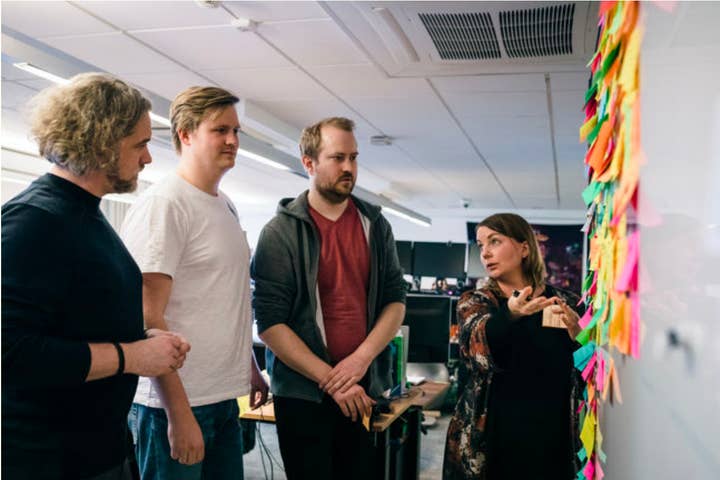How Minecraft and Mojang taught Xbox how to buy studios
Xbox's new studios: “Things have been almost exactly the same, just without the terror of going out of business”
This is part of a series of features with Xbox Game Studios. Check out the teams discuss developing games for Game Pass here, and their view on Microsoft's next-gen strategy here.
Between E3 2018 and 2019, Xbox revealed the fruits of a surprising spending spree.
Compulsion Games, Double Fine, InXile, Ninja Theory, Obsidian, Playground Games and Undead Labs had all joined the Microsoft family, and the news was greeted by whoops from the Xbox faithful and intrigued eyebrow raising from us in the business press.
Yet among that excitement was an air of caution, too. Buying companies is easy, but integrating them is incredibly hard, and Microsoft is no stranger to acquisitions gone wrong. Picking up seven new businesses and trying to get them working within a large organisation seems like a herculean task fraught with risk.
"If you look at the list, you can find our lineage with many of those studios," explains Microsoft's executive vice president of gaming Phil Spencer.
"Take Ninja Theory -- we did Kung Fu Chaos with them when they were Just Add Monsters on the original Xbox. You think about our relationship with Tim Schafer around Psychonauts and some of the Kinect work that he did. So it starts from a relationship that has been built.
"The other thing that gave us confidence is the track record we had with studios. Mojang was a big point for us, where it was obviously a large acquisition, with an incredible franchise in Minecraft. But Minecraft is not a non-complex product. It's on a lot of platforms, it is very community-led. Our ability to integrate Mojang and grow Minecraft also gave us confidence."

Around $2.5 billion was spent on Mojang, so a lot was riding on that integration going right. The man tasked with doing it was Matt Booty, the person who now finds himself doing the same thing with these seven new teams.
"With Minecraft, it wasn't our place to steer a game that we had not created ourselves," he tells us. "It was a game that had this vibrant, thriving community. There was a studio culture and identity there.
"And we had a lot to learn from Mojang. It would be easy for a large organisation to come in and say: 'Hey, we're going to show you how it's done. We're going to get you off this Java code. We're going to get things moved over to C. We're going to get you off Amazon Web Services and over to Azure.' But it's important to realise that the conditions that created Minecraft, how it came to be, are likely to be things that are difficult to recreate within a more corporate structure."
Mojang studio head Helen Chiang continues: "The approach we took to the acquisition came from Matt. A lot of times you see big companies buy smaller companies, and it's easy to lose the magic of what you've purchased. It was really important that this acquisition was about retaining all of that great talent within the studio, and ensuring that you're continuing to foster that creative spirit. It's not all about business results; it is about building a foundation of trust. As you can imagine, there was quite a gap in the culture between an indie studio and a large corporate company like Microsoft. It was about making sure they trusted that the leaders were not going to do harmful things to Minecraft."
She continues: "And how Matt integrated Mojang really helped set the stage for how Xbox acquired and integrated all of the additional studios. Before, Microsoft acquired companies in a specific way. And this not only set the foundation for additional game studios, but when you look at LinkedIn and GitHub, they also have this minimally integrated approach. That really was something that Mojang set the foundation for."

Limited integration -- or "unplugged studios" -- is the strategy of allowing developers to effectively stay as they are, only with the financial firepower and support of the larger business. This idea proved attractive to many of the new acquisitions.
"Things have been almost exactly the same, just without the terror of going out of business all the time," says Double Fine boss Tim Schafer. "We've been doing this for 20 years, so it's not that terrifying. But you do think about where we're going to get the next six months of salaries from. That fills your mind a lot, and I am just getting used to my mind being free of that. Being able to apply it to games and creativity has been an adjustment, but a really great adjustment."
Obsidian head Feargus Urquhart says: "Around spring or summer last year, I had a number of employees who were super disappointed because they thought it was going to be more different [laughs]. Not from the standpoint of us not being supported, but because they felt we were becoming part of this 'big Microsoft'.
"The only really different aspect of my day-to-day is not having to be the guy getting the money from the publishers. That has also changed how we approach development. A lot of times as an independent, how you develop games is dictated by the partner, because it's their money and they have a way they want you to make a game. It's been cool to apply those years of experience, and say 'hey, we can make the games the way we want to make them'."
InXile boss Brian Fargo gives an example of Microsoft's approach to the new teams.
"It's important to leave [the studios] alone for as long as possible, until they've got something that can walk on its own"
Matt Booty, Xbox
"I knew what I wanted to do next. It was a category we loved, it was a unique opportunity in the marketplace, and I had all the ancillary information as to why I felt it was a great idea. I prepared the whole thing, I sat with Matt and said here is what we want to do, and he said 'if that's what you want to do, then great'. It was over in like 60 seconds. That was wild for me, because we're used to this six month process of back-and-forth with a million questions -- with things like 'how many pieces of art will there be?'
"I had to go back to Matt a second time and go: 'I just want to be sure that you understood that this is what we're doing.' And he said: 'I love the idea so much that I don't want to see anything, so that you guys over-index on what I say and think you have to change it in some capacity.' That's a true story."
Booty explains: "It's kind-of a phased thing. Take Compulsion. They're working on their next game and have spent the last year on early ideation. I try to keep us as far away from that as possible. And then, as it starts to get exposure within the organisation, feedback will come in and things will start to steer. But it's important to leave them alone for as long as possible, until they've got something that can walk on its own. And then there's no shortage of feedback within Xbox."
Booty explains that what Microsoft is focused on is helping these studios take their next step, whatever that maybe. Some might want to become bigger outfits, whereas others have more specific goals.
"With Psychonauts 2, we could see the end of our budget coming up, and so we had cut a lot of stuff," Schafer explains. "We had cut our boss fights. Now we are able to put those back in, and we're like 'we think people would have noticed if we didn't have those boss fights'. Being able to complete the game in the way that it was meant to be was very important.
"I'm looking forward to doing things for the right reasons. When you only have a certain amount of time and money, you might jump into a part of the game that you're not ready to jump into, or start working on art before you're ready with design. But now I look forward to this era where we are doing everything for what is right for the game."
InXile was eager to grow its team, and has already added more than 20 people since the acquisition, with plans to add 20 more.
"As a smaller developer, we always knew the positions that we were missing, and the things that we wanted to do to up our game," Fargo explains. "We want to show what we're capable of and step it up a notch in terms of the experiences we can deliver.
"It sounds weird but running an independent studio can be a lonely thing"
Feargus Urquhart, Obsidian
"Specific to that, you have these small, entrepreneurial, artistic companies who want to craft something, but oftentimes they don't have the financial backing that they need. So it's hard to get the great talent, because that talent wants stability. We've been able to bring on the lead producer from World of Warcraft, an artist from Rockstar, one of the lead designers who worked on God of War. It's been really compelling to say that you can touch the product, you can get your hands dirty and really push the envelope on what we're creating, and we get to do that with the financial stability. I have already seen the quality of what we're producing, and it's come up in leaps and bounds over the last year."
For Obsidian, it's less about expansion, and more about making the most of Microsoft's other divisions, including user research labs, tech teams and, most of all, other studios.
"One of the most important things is just access to experience," Urquhart says. "Matt has got us altogether, and we're a cranky group and we don't always like to go somewhere because we've got all this other stuff going on. But whenever we do get together, it's great because we forged friendships.
"It sounds weird, but running an independent studio can be a lonely thing. We know each other, but we're all usually so engrossed in what we're doing. But now we're here, we are all up on Teams together, so it's very easy for me to send a thing to Alan at Turn 10 and go 'hey, how do we blah blah blah blah', and we either chat via text or we get on a call."

And Urquhart feels that the benefit of limited integration works both ways, as it allows Microsoft to learn from how these previously independent teams operate.
"The established Microsoft studios, they have another way of looking at development. I am going to be hyperbolic, but you have the limited resources versus infinite resources, and how do different groups deal with that? To be honest, a lot of what I've had to do with Microsoft is back off saying 'we can only spend 17 cents on that'. Not that we should spend 17,000 cents on that, but I need to think longer term. And sometimes being an independent studio involves thinking shorter term.
"And I also think it's interesting -- not to toot our horns, but you've got Brian Fargo, and me, and Tim Schafer and Nina [Kristensen, Ninja Theory], and all these people with lots of experience making games, and we have an effect on the organisation. This idea of the limited integration studio was the best idea. Maybe it was intended or unintended, but by letting us be who we are, we then have a positive effect on Microsoft."
The first results of these new acquisitions are now beginning to appear, with the likes of Ninja Theory's Bleeding Edge, Obsidian's Grounded, InXile's Wasteland 3 and Double Fine's Psychonauts 2.
All of these games will be included in the Xbox Game Pass subscription service, which prompted Microsoft to buy these studios in the first place. Much like with any successful subscription service, Game Pass needs a regular supply of different content.
"With Game Pass it wouldn't make sense to acquire Double Fine and then assign us a bunch of Forza DLC"
Tim Schafer, Double Fine
"When they first started talking to us about acquiring studios, we said we are not looking to sell," Schafer says. "But going up and having lunch with Mr Booty, and hearing the vision for his business and Game Pass... I started to see two things that were important to me. One was that we could keep our culture. I was concerned, I was like: Will I need to put up a big Windows logo in our lobby, and change my email address to @microsoft.com? And he was like 'no, none of that, you stay your own company, you're just part of our team'. Of course, everyone would say that, but I kind-of believed it because I started to understand their vision for Game Pass.
"With Game Pass, it wouldn't make sense to acquire Double Fine and then assign us a bunch of Forza DLC. That's not what you'd want from a studio like Double Fine. And Game Pass seems like a great opportunity to have a diversity of games, a plethora of unusual content... I can see how the type of games that Double Fine makes could fit into that."
With seven new studios and a far stronger release slate, Booty and Spencer have switched focus from buying studios to integrating the ones it has. But the wallet hasn't been closed entirely.
"We acquired quite a few new studios in a short amount of time, and we want to make sure that those studios are on-boarded in the right way," Spencer concludes. "As Matt and I were talking about it, we just wanted to make sure that we treated the incoming studios as full parts of the organisation. That they felt supported.
"The Game Pass portfolio and subscriber base continues to grow. We're launching a new console. Last year was our biggest year ever on PC in terms of revenue as Xbox Game Studios. A lot of the business is doing really well, so we're always in the market for new opportunities with studios.
"The first priority was making sure the studios had the things that they needed to build the best versions of their games. That means extending some of the timelines, and giving them more budgets. We have really strong support from Satya Nadella, the CEO of Microsoft, and Amy Hood, the CFO. And there's been no signal at all that we should be slowing down, but just to go at a pace that is maintainable for us as a leadership team. We're always out there talking to people. But it has to be the right opportunity."

